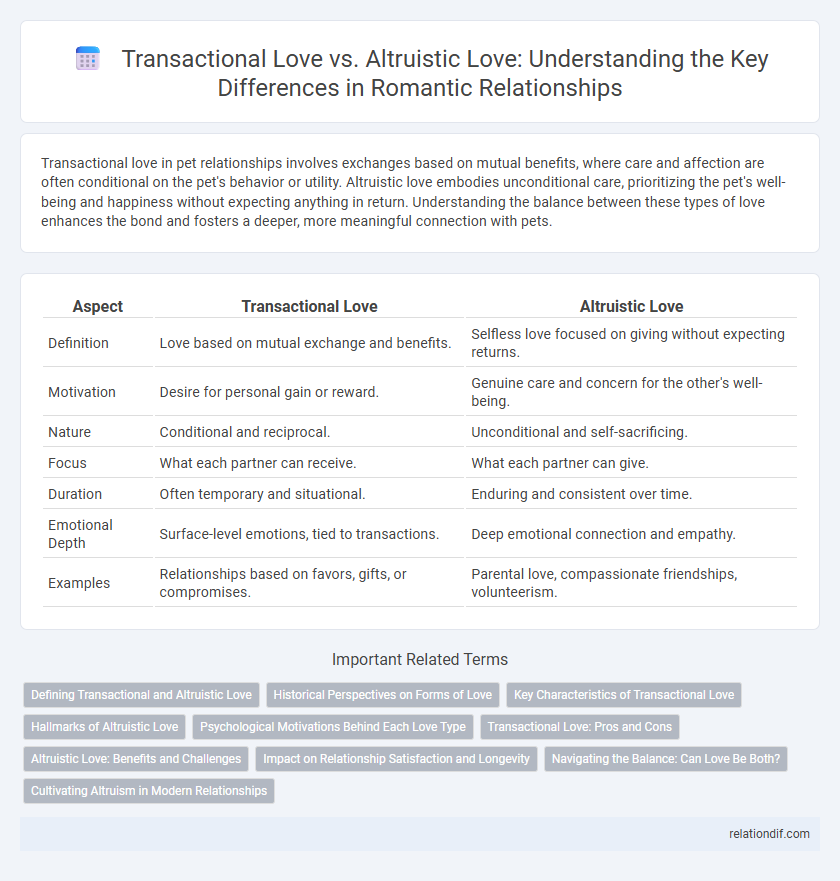Transactional love in pet relationships involves exchanges based on mutual benefits, where care and affection are often conditional on the pet's behavior or utility. Altruistic love embodies unconditional care, prioritizing the pet's well-being and happiness without expecting anything in return. Understanding the balance between these types of love enhances the bond and fosters a deeper, more meaningful connection with pets.
Table of Comparison
| Aspect | Transactional Love | Altruistic Love |
|---|---|---|
| Definition | Love based on mutual exchange and benefits. | Selfless love focused on giving without expecting returns. |
| Motivation | Desire for personal gain or reward. | Genuine care and concern for the other's well-being. |
| Nature | Conditional and reciprocal. | Unconditional and self-sacrificing. |
| Focus | What each partner can receive. | What each partner can give. |
| Duration | Often temporary and situational. | Enduring and consistent over time. |
| Emotional Depth | Surface-level emotions, tied to transactions. | Deep emotional connection and empathy. |
| Examples | Relationships based on favors, gifts, or compromises. | Parental love, compassionate friendships, volunteerism. |
Defining Transactional and Altruistic Love
Transactional love is characterized by a reciprocal exchange of benefits, where affection is often contingent upon receiving something in return, such as support, gifts, or validation. Altruistic love, in contrast, embodies selfless concern and unconditional care for another's well-being without expecting anything back. Defining these forms of love highlights the difference between relationships motivated by personal gain versus those driven by genuine compassion and empathy.
Historical Perspectives on Forms of Love
Historical perspectives reveal that transactional love, often rooted in economic or social exchange, dominated many ancient societies where marriage arrangements prioritized alliances and material gain. Altruistic love, characterized by selflessness and unconditional care, gained philosophical emphasis through thinkers like Plato and later religious traditions, promoting love as a moral ideal beyond personal benefit. These evolving views illustrate a shift from pragmatic relationships toward ideals valuing emotional depth and spiritual connection in human bonds.
Key Characteristics of Transactional Love
Transactional love is characterized by a reciprocal exchange where affection and support are given with the expectation of receiving something in return, often emphasizing material benefits or social status. The relationship is contingent on fulfilling specific conditions and tends to be conditional, with partners assessing gains and losses continuously. Trust and emotional depth may be limited as interactions are guided by self-interest rather than genuine care or empathy.
Hallmarks of Altruistic Love
Altruistic love is characterized by selfless concern for the well-being of others, marked by empathy, compassion, and unconditional giving without expecting anything in return. It fosters deep emotional connections based on trust, respect, and genuine care, differing fundamentally from transactional love, which revolves around mutual exchange and personal gain. The hallmarks of altruistic love include sacrifice, patience, forgiveness, and a commitment to support others through challenges, highlighting its enduring and transformative nature.
Psychological Motivations Behind Each Love Type
Transactional love is primarily driven by psychological motivations centered on personal gain, reciprocation, and conditional support, where affection depends on the fulfillment of specific needs or expectations. Altruistic love, motivated by empathy, selflessness, and unconditional regard, seeks the well-being and happiness of the loved one without anticipating direct benefits. These contrasting motivations influence emotional investment, relationship satisfaction, and the stability of bonds within romantic and social contexts.
Transactional Love: Pros and Cons
Transactional love centers on reciprocal exchanges where affection and support are contingent upon meeting specific conditions or expectations. This type of love can foster clear communication and mutual benefit, enabling partners to understand boundaries and maintain balance in the relationship. However, transactional love may limit emotional depth and lead to conditional attachments, potentially undermining long-term trust and genuine intimacy.
Altruistic Love: Benefits and Challenges
Altruistic love, characterized by selfless care and unconditional support, fosters deep emotional connections and promotes psychological well-being for both giver and receiver. This form of love enhances empathy, trust, and social cohesion, contributing to long-lasting and meaningful relationships. Challenges include potential emotional exhaustion and boundary issues, requiring mindfulness to maintain healthy reciprocity and personal well-being.
Impact on Relationship Satisfaction and Longevity
Transactional love, characterized by exchanges and conditional affection, often leads to lower relationship satisfaction and reduced longevity due to unmet expectations and insecurity. Altruistic love, marked by selflessness and unconditional support, enhances emotional intimacy and fosters enduring, satisfying relationships. Studies show couples practicing altruistic love experience higher resilience and sustained partnership quality over time.
Navigating the Balance: Can Love Be Both?
Navigating the balance between transactional love and altruistic love involves recognizing the interplay of mutual exchange and selfless giving within relationships. Transactional love emphasizes reciprocal benefits and clear expectations, while altruistic love prioritizes unconditional care and emotional generosity without expecting anything in return. Understanding how to integrate these dynamics fosters healthier connections that respect individual needs and promote genuine emotional intimacy.
Cultivating Altruism in Modern Relationships
Cultivating altruism in modern relationships fosters deeper emotional connection and long-term satisfaction by prioritizing selfless acts of kindness and understanding over conditional exchanges. Research shows that partners who consistently practice empathy and support without expecting immediate rewards experience enhanced intimacy and resilience. Emphasizing altruistic love reduces transactional tendencies, encouraging a bond rooted in genuine care and mutual growth.
Transactional Love vs Altruistic Love Infographic

 relationdif.com
relationdif.com